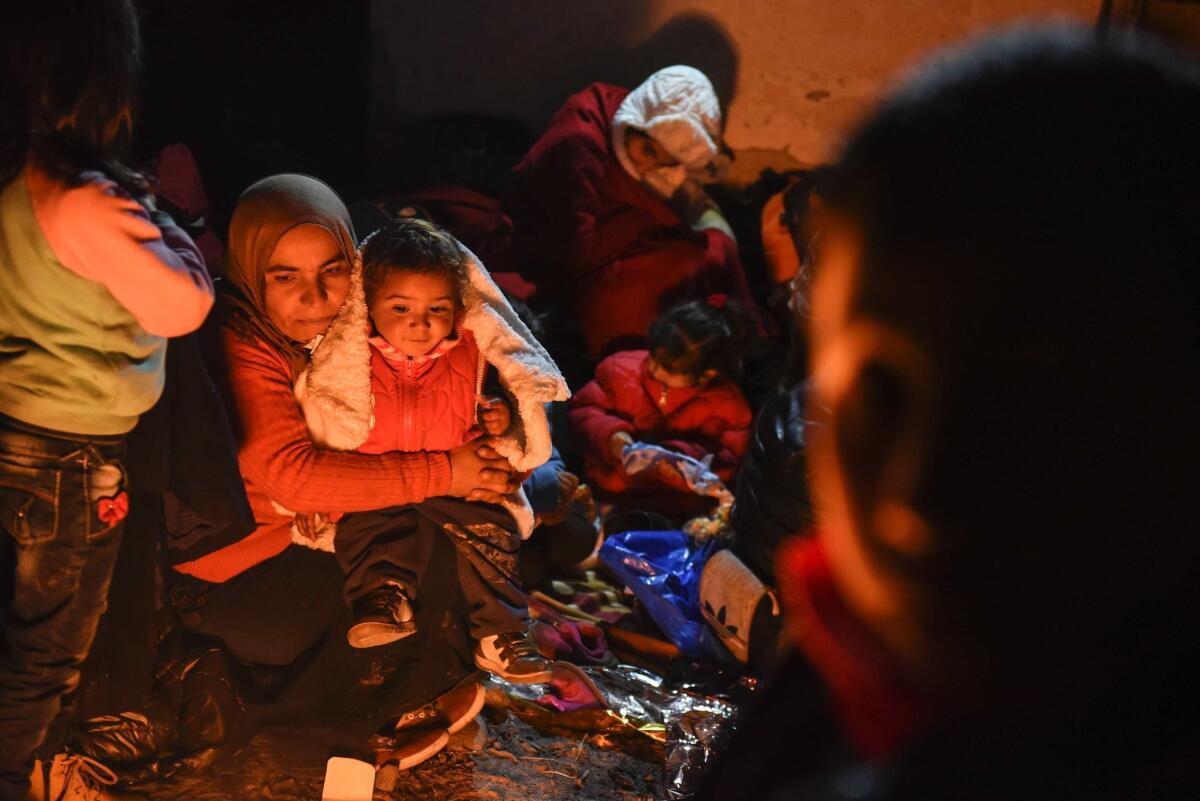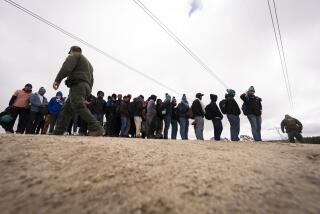Op-Ed: The story of Christmas makes it clear: Welcome the refugee

Migrants and refugees warm up around a bonfire after crossing the Greek-Macedonian border as they wait to enter a refugee camp on Dec. 6.
The newborn child was a refugee. His parents had traveled a great distance from one jurisdiction to another in obedience to a political mandate they did not fully understand. Exhausted from a long day’s journey, they sought lodging but were turned away, so they took shelter in a stable. Amid farm animals, the labor pains began and the woman gave birth.
We have prettified the scene over the centuries. We have suspended fluttering angels from the rafters and cued the animals to gaze at the tableau adoringly. But the reality, I suspect, was different. The animals seemed more menacing than worshipful. The cold air of a desert night swept through the stable, inducing shivers. The stench of manure was overwhelming. And the conditions for giving birth were hardly hygienic. We have no record of what the young parents had for supper that night, but I suspect they would have been lucky to salvage a crust of bread.
Jesus, the boy in the stable, beckoned his followers to care for “the least of these,” a description that certainly applies to immigrants and refugees.
This is the nativity that millions of Christians around the world celebrate this time of year. The scene I have just described provides the pretext for extended celebrations and an orgy of gift-giving.
We don’t need another screed against the crass commercialization of an ostensibly religious holiday; that battle was lost long ago. We have hollowed out the meaning of Christmas so completely that for many, even most, the newborn child is an afterthought, not so much rejected as ignored.
But if we look carefully, how is it possible to miss the parallels between the young family in the stable and the new wave of refugees searching for a safe place to live, to rear their children? They lack food and clothing, and they have been turned away from one potential shelter after another. They want nothing more than a reprieve from the political machinations that threaten their survival. They even come from the same part of the world, the Levant.
The Bible tells us, repeatedly and unambiguously, to welcome immigrants. Exodus 23: “Do not oppress a foreigner.” Leviticus 19: “The stranger who dwells among you shall be to you as one born among you, and you shall love him as yourself.” Further along in Leviticus, we find guidance for feeding strangers: “When you reap the harvest of your land, do not reap to the very edges of your field or gather the gleanings of your harvest. Leave them for the poor and for the foreigner residing among you.” Still later, Leviticus commands us to treat aliens equally: “You are to have the same law for the foreigner and the native-born.”
Jesus, the boy in the stable, beckoned his followers to care for “the least of these,” a description that certainly applies to immigrants and refugees. Jesus later described those who would be admitted into the kingdom of heaven as those who demonstrated acts of kindness toward those in need: “For I was hungry and you gave me something to eat, I was thirsty and you gave me something to drink, I was a stranger and you invited me in, I needed clothes and you clothed me, I was sick and you looked after me, I was in prison and you came to visit me.”
In the United States, we anticipate Christmas at a time of fevered xenophobia. Current events — the Paris and San Bernardino attacks, the ongoing barbarity of Islamic State, the persistence of Al Qaeda — make it easy for unprincipled politicians to stoke inchoate fears. Every refugee is a terrorist, a criminal or, at best, an intruder imposing on our goodwill. To a demagogue, even migrant children aren’t victims but enemies-in-waiting.
“I don’t think orphans under 5 should be admitted to the United States at this point,” New Jersey Gov. Chris Christie said in November.
You would think that America’s evangelicals, those who trumpet their fidelity to the faith and to the Bible, would stand against such demonization. These are the people, after all, who claim to be the guardians of Christmas, ever on the lookout for the “true meaning” of Christmas. “Jesus is the Reason for the Season” read the bumper stickers, and “Don’t Take Christ Out of Christmas.”
Yet politically conservative evangelicals have been gravitating to the Republican contenders spewing nativist rhetoric. When Bob Vander Plaats, considered the most influential religious right leader in Iowa, endorsed Ted Cruz this month, he cited his candidate’s uncompromising immigrant exclusion policy.
How does that square with the child in the stable who provides the occasion for the season’s
celebrations?
Randall Balmer, an Episcopal priest, is head of the religion department and director of the Society of Fellows at Dartmouth College.
Follow the Opinion section on Twitter @latimesopinion and Facebook
More to Read
A cure for the common opinion
Get thought-provoking perspectives with our weekly newsletter.
You may occasionally receive promotional content from the Los Angeles Times.










